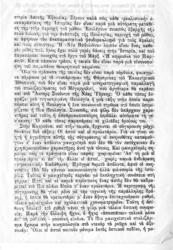Program
ΑΛΚΥΟΝΙΣ - ΝΕΑ ΒΑΒΥΛΩΝΙΑ
Programme for the "ALKYONIDA" Cinema Art Hall. The title of film is on the front page. It is "BABYLON" by Kozintsev-Trauberg. The full title is in on the inside page: "NEW BABYLON". The main cast follows. The review by film critic-thinker Vasilis Rafailidis is reproduced in the programme from "TO VEMA" newspaper (27 November issue – no year given). "NEW BABYLON", 1929 – first shown in Europe in 1970 – is the peak in the creative search of the Kozintsev-Trauberg duo, as it was shaped through the experimental research team of the Soviet cinema "The Factory of the Eccentric Actor", which they found with Sergei Yutkevich in Leningrad, in 1921. "The Factory of the Eccentric Actor" applies in the cinema the methods of the great Russian theatrical director Meyerhold, while it not only influences the system proposed by the Actors Studios in New York from the end of the '40s onwards, but it has an impact on the theories of the film magazine "Cahiers du Cinema", which revives the basic motto of the Russian team: "Revolution in Art".
"NEW BABYLON" processes in a cinematic way the events during the 72 hours of the Paris Communalism (18 March – 28 May 1817), avoiding any pseudo-realistic rendering of the history, although the film repeatedly cites Marx's work "The Paris Communalism". Opting for the creation of types-symbols rather than characters, Kozintsev-Trauberg are driven by a manichaean outlook (there is nothing but proletarians and bourgeois confronting each other), which is enhanced through the cinematic language they choose, deeply influenced by Eisenstein's "dialectic montage".
Focusing on the technique of parallel action, the concept of angles of capture as a means of stressing the differences between the two opposing groups in the composition of static scenes that bring to mind painters, like Manes, Degas, Daunier and Renoir, as well as the development of a rhythmic pattern through montage that reveals the musicality of the film – although it is a silent film – Kozintsev-Trauberg achieve what Vasilis Raphailidis aptly notes: "[…] the cinema is a way of writing not dramatization, which is the desired end result of every cinematic advancement". The note concludes with reference to the other films adapted from great literary works that Kozintsev will make in the next decades: "DON QUIXOTE" (1957), "HAMLET" (1964) and "KING LEAR" (1969).
- Cinema ΑΛΚΥΟΝΙΣ
- Pages 4
- Τόπος Έκδοσης ATHENS
- Language GREEK, MODERN (1453 - )
- Height 17 CM
- Width 12,5 CM
- Paper Type ΒΙΟΜΗΧΑΝΙΚΟ
- Status ΠΟΛΥ ΚΑΛΗ







